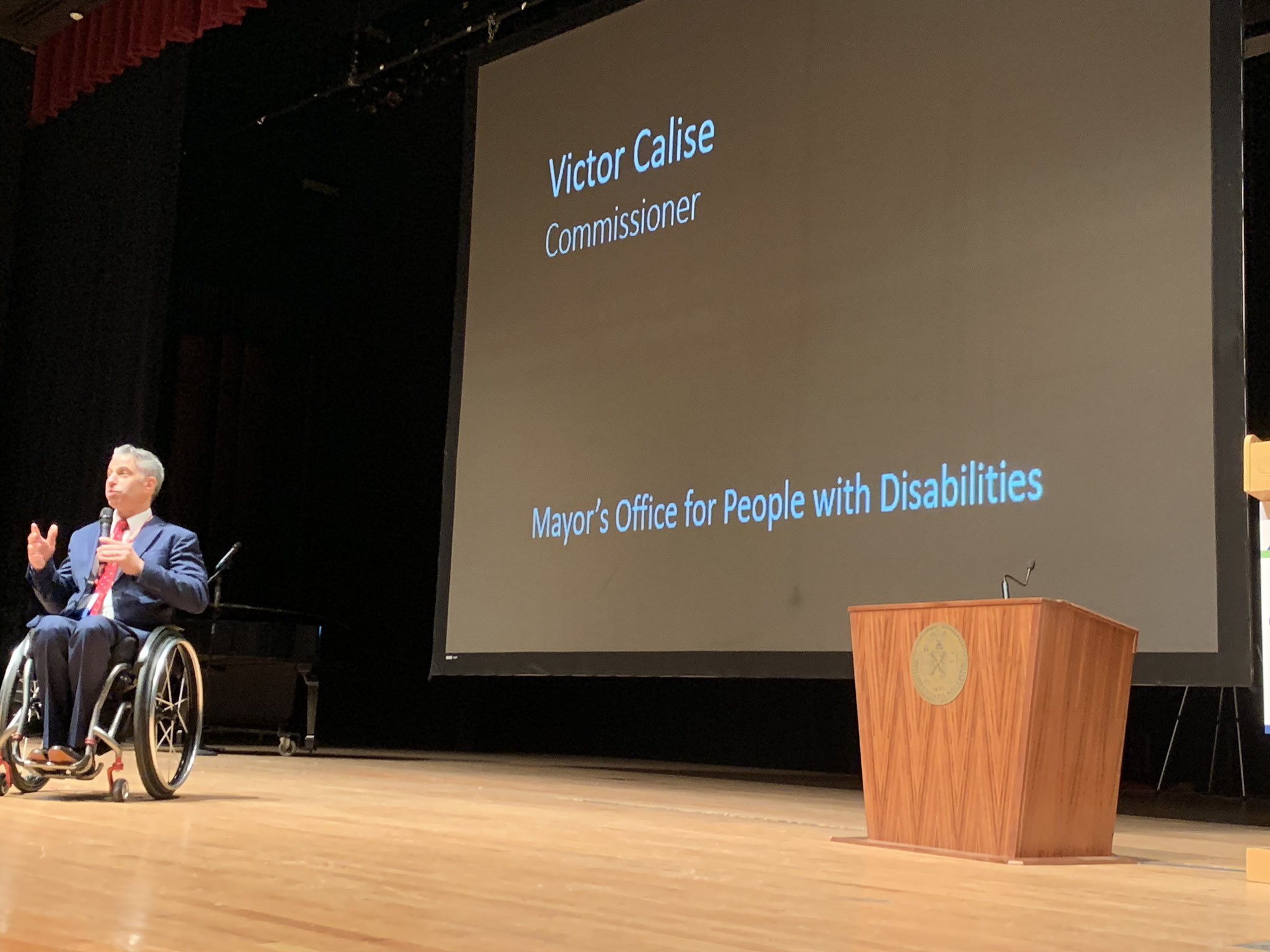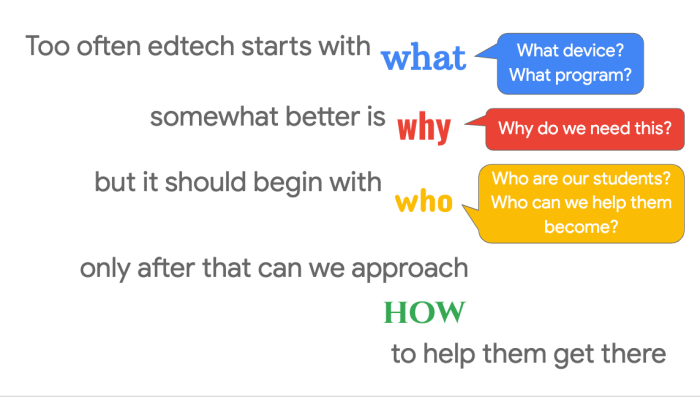You can also find more info on the 2018 Summit.
I was able to attend the NYC Schools Tech Summit again in its 7th year and was able to play an important role in the efforts of this year’s summit which found a large portion of its focus on inclusion and accessibility. Given how deeply I believe in accessibility advocacy, I was eager to present 3 sessions and help prepare the materials for a few others that were being presented by amazing educators and friends of mine. As always though, regardless of the role I played, I learned a great deal, was reminded of long held beliefs, and inspired by the efforts of great teachers. Here is the compendium of those experiences.
Insights
Educational Tenets

- Technology in skilled hands is transformative. Many are familiar with the George Couros quote, but it’s true beyond teachers. Good tech is the kind that lands people on the moon or lets the non-verbal person communicate for the first time. That should be our goal.
- Putting the same non-transformative learning on a computer changes nothing. Just because a worksheet is now on Chromebook may add some capabilities for more accessible learning, but not if you don’t access it. And it is still the same kind of wrote learning that shuns the transformation necessary for modern learning.
- We must prepare students to be future-ready lifelong learners. The jobs and the world of the future are rapidly changing. We must change too and teach essential 21st-century skills.
- There are 5 key tenants for school culture shift: equity, trust, agency, collaboration, and risk-taking. Jason Todd Green, the keynote speaker and Co-Founder of LINC, shared his keys to shifting culture meaningfully. Check out more details at Linc Learning. It’s similar to those keys to creating a safe and effective classroom space.
- We must put continually push ourselves in a position to excel. We’re 50 years from The moon landing, Woodstock, and championship Mets. Now while the struggle of the Mets will continue, is our classroom and, by extension, our world better positioned to excel- and push innovation, artistry, and excellence.
- We grow more powerfully together. This one is sometimes a challenge for my introverted nature, but connections to other inspiring educators have helped me to grow and sustain me in ways I think many of them are unaware of. (And maybe they shouldn’t be-future problem to solve). Thank you friends who challenge me to go outside my comfort zone..
Classroom Culture
- Quick assessment of classroom culture What happens when you’re not there?
- The deepest learning is often the messiest and most uncomfortable. We must seek opportunities to find discomfort and be willing to exist there long enough for breakthroughs to happen. I love messy and loud learning. It’s hard for humans, let alone teachers, to relinquish control. But student-centered learning with intense back and forth discussions are incredibly powerful classroom experiences. Learn to embrace it.
- PD is way better when it’s an escape room (or any game or hands-on learning experience). Traditional long-winded lectures are ineffective for student learning, right? So why do we do that to teachers? Even the initially reticent teachers in my EdTech Adventure session were exuberant for the experience by the end.
- Play turns game over into try again with experience. Those same students frustrated and giving up in class will, in Fortnite or Super Mario, lose and restart again and again trying some new strategy each time. This is not because the finally learned grit, but because they are incentivized to exhibit it by the medium.
- Students are forced to adjust and find their learning elsewhere when the methods of the classroom fail them. What ways did you have to adjust to make learning work for you? Many of my classes never met my desires and needs and my boredom forced me to seek elsewhere and I struggled later to learn how to learn and study effectively.
- We should be creating creators. We have no shortage of consumers in our world, but who will be our future’s creators? If we’re building rooms where students just consume material we give them instead of building their own solutions than we aren’t meeting the needs of now.
- There is no lack of desire to learn. If students are running away from their classrooms and towards after-school programs, it means it’s not the students who lack the desire to learn but the classrooms that lack the ability to reach them.
Inclusion & Accessibility

- We all have or will have some form of disability that takes on various forms. Whether it’s the glasses you wear or your now aging knees that give you challenges, we will all, if we live long enough, struggle with some form of disability. And for that reason we will all benefit from an accessible and universally designed world.
- Focus not on the differences of people with disabilities but the talent of the individual. -Neil Milliken
- Disability often gets short shrift. In the recent presidential debates, the candidates discussed race, equity, and class challenges. One major category of people, those with disabilities, is often left out.
- Disability and disability advocacy are often misunderstood. There are bad presentations on accessibility just as on any other topic. but so often any talk about overcoming challenges of race or disability gets the automatic standing ovation and that can be just as condescending. Check the failures of disability in pop culture.
- Our native language speaks to our soul and crafts our reality. The way we can effectively communicate with the 49% of New Yorkers who are non-native speakers is to speak to their Watch Lara Boroditsky’s TED Talk on language for greater understanding.
- Real achievement is choice. While providing access is essential, providing the capability for independent action and choice show us we’re on the right road. That’s demonstrated by Victor Calise, Commissioner of the New York City Mayor’s Office for People with Disabilities, who was provided a wheelchair-accessible podium, but he was still empowered to ignore it for the purpose of connecting with his audience.
- Our Goal: Students capable of creating and advocating for themselves.
- We look for a day when we just have students or workers and not students and workers with disabilities. While identifying and addressing particular challenges for those with disabilities, our best days will be when people are empowered enough to participate and contribute so that no thought need be given to those particular challenges. When it’s just automatic and embedded.
Taking Action

- The only thing worse than being blind, is having sight but no vision. – Helen Keller
- Conferences and summits can be inspiring, but that can be meaningless on its own. 1 of every 300 Americans will be student in NYC public schools. We should be trailblazing and we can if the people moved to change take the steps to make that change lasting and genuine.
- Create the culture you want to work in.
- Our decisions must begin focusing on the the who of learning before we get to what.
